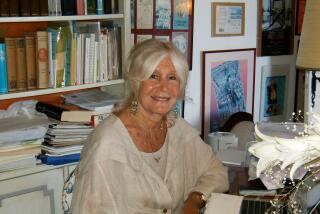The plot thickens in battle over author’s estate
Not even Stieg Larsson could’ve dreamed up “The Girl Who Fought for a Share of the Inheritance.”
But five years after his untimely death and millions of book sales later, the Swedish crime writer’s estate is caught in a bitter feud worthy of one of his thrillers, complete with a strong-willed female protagonist, a murky bog of possible villains and a plot that has transfixed this Scandinavian country.
It’s a saga of love, literature and the law. Of blood versus bond, pitting Larsson’s relatives against his lifelong companion for control of a posthumous publishing juggernaut that shows no sign of slowing.
As anyone who’s stepped into a bookstore lately knows, Larsson was the author of the darkly convoluted crime novels “The Girl With the Dragon Tattoo” and “The Girl Who Played With Fire.” Last year, industry watchers named him the world’s second-bestselling writer.
The third installment in his “Millennium” series, “The Girl Who Kicked the Hornets’ Nest,” is due out in the United States in May and is one of the most hotly anticipated titles of 2010. Hollywood, inevitably, is interested.
Critics and fans have swooned over the books’ dense plotting, their evocative descriptions of the seamy underbelly of society and the unlikely heroine, Lisbeth Salander, a bisexual, emotionally wounded and almost superhumanly gifted computer hacker and avenging angel rolled into one.
Larsson, though, never lived to see his success. A workaholic and nonstop smoker, he collapsed and died Nov. 9, 2004, after climbing seven flights of stairs to his office because the elevator was out of order. He was 50.
His first novel, written as an escape from his job as a crusading journalist, was months away from hitting the shelves. Manuscripts for the next two were already in the hands of his publishers, and a fourth was in progress.
Because Larsson never made a will, everything he owned, including the rights to his work, passed to his father and brother.
The woman who was at his side for 30 years inherited nothing. She and Larsson never married -- a fact that has exacted an unforeseen price. Swedish law does not recognize common-law relationships, and she is not entitled to a penny of his estate.
Larsson couldn’t have written a better cliffhanger.
They had certainly intended to tie the knot when they were younger, said Eva Gabrielsson, the love of Larsson’s life. But two things conspired against them, she said.
“We did plan to get married, in 1983, except the United States did something bad then: You invaded Grenada,” the longtime leftist said recently over coffee.
She and Larsson had visited the Caribbean island nation a few years before in support of its left-wing government. After the U.S. invasion led to the regime’s overthrow, the couple decided to go back and investigate the situation, so marriage plans were put “on hold,” said Gabrielsson, now 56.
Their devotion to left-wing causes had brought them together: They were 18 and living in northern Sweden in 1972 when they met at a rally against the Vietnam War.
It was Gabrielsson’s first demonstration. Larsson, already a young leader in the local antiwar movement, spotted the pretty new protester and quickly set about recruiting her, Gabrielsson recalled with a chuckle. Two years later, they were living together.
The couple moved to Stockholm in 1977 so Gabrielsson could pursue her studies in architecture. Larsson worked for a while at the post office, but eventually found an outlet that combined his two consuming passions: writing and combating fascism.
First for the British anti-fascist magazine Searchlight and then for Expo, the Swedish equivalent he helped found, Larsson campaigned against the neo-Nazis who were gaining ground in his homeland. They were known to be a violent group, incriminated in various bombings and killings.
Death threats soon began coming Larsson’s way, so serious that, in 1994, the government tried and convicted the editors of a far-right magazine that published Larsson’s photo and address and called him a traitor who had to be stopped.
Larsson and Gabrielsson decided not to marry, to prevent his enemies from combing through public records and finding out about, and targeting, her. The couple were always on the alert, limiting their appearances together, watching who got on and off their bus, installing steel doors at their apartment.
“We had security measures -- not being married so he couldn’t be tracked, being very observant when you go home. If you feel something’s wrong, you don’t go home. Go somewhere else,” Gabrielsson said.
A different woman might have tried to persuade Larsson to give up such perilous work. Not Gabrielsson, who clung to the same ideals.
“I loved him for who he was. I didn’t want to change him,” she said, adding with a steely gaze: “I would never admit to you that I felt any fear. . . . Even if you feel fear, it doesn’t matter. It doesn’t stop you.”
For relief, Larsson turned to writing fiction. In 2002, the “Millennium” series was born while he and Gabrielsson were staying at a summer cottage in the Stockholm archipelago.
“Stieg had nothing to do,” Gabrielsson recalled. “That’s when he picked up a short story he had written about an old man selling flowers who gets murdered. And that became the first chapter of ‘Millennium.’ ”
Over the next two years, an astounding 2,000 pages poured forth from Larsson’s fertile imagination. After being rejected by one publisher, his manuscripts were snapped up by the Norstedts publishing house, which offered him a three-book deal.
“It was unusual to offer a first-time writer that kind of contract,” said his editor, Eva Gedin. “He was quite self-assured. . . . He not only hoped but believed that they would do well. He said, ‘This will be my retirement fund.’ ”
He died before he was able to retire. Gabrielsson’s grief was soon compounded by news that his estate, though still modest at that point, would revert to his family.
An amicable settlement might have been possible in the beginning. But the situation was instantly complicated by publication of Larsson’s first book in the summer of 2005 and its runaway success. In Sweden alone, 3.5 million copies of his novels have been sold, about one for every three people. Worldwide sales exceed 20 million in 41 countries.
Gabrielsson says Larsson’s father and brother (his mother is dead) were eager to cash in on the sudden bonanza.
At a deeper level, she believes, the family is trying somehow to make up for the fact that they never really got along with Larsson or understood him. Controlling his legacy, she said, is a way for them to reclaim him.
“They simply thought that this was theirs, they finally owned Stieg,” she declared. “This is their way of getting hold of him again.”
Erland and Joakim Larsson are tired of being cast as villains.
They are simple, ordinary folk whose motives and words have been distorted by the Swedish media, which Gabrielsson, with her contacts through Larsson’s journalism, has effectively marshaled against them, they say.
They deny being estranged from the author. Erland said he saw his son a couple of times a year whenever he went down to Stockholm or when Larsson came north; Joakim, too, was in contact with his older brother.
“We were no strangers to Stieg. He knew who we were,” Erland, 74, said recently in Stockholm, where he and Joakim had come for the premiere of a Swedish-produced “Millennium” film.
As a boy, Stieg was sent to live with his grandfather while his parents struggled to establish themselves financially. He returned when he was 9. A few years later, seeing his aptitude for writing, his parents bought him the typewriter that launched his vocation.
“We shared the same room, and you could hear tap, tap, tap -- ting! -- all through the night,” Joakim, 52, recalled. “In the evening before we slept, he told stories -- adventure stories, detective stories. I just loved them.”
The family talked politics around the dinner table, which helped lay the foundation for Larsson’s left-wing views. From his mother, a member of the local council, he developed a fierce commitment to equal rights for women, a feminism easily detectable in the character of Lisbeth Salander.
Erland said he worried for his son’s safety as a whistle-blowing reporter and also for his financial future, since journalism didn’t pay much.
“Through the years I told him, ‘Write something commercial,’ ” Erland said. “He was always interested in the criminal world. Whenever he came home he’d have a bag full of detective books.”
Joakim says he encouraged his brother to get married, having done so himself when he discovered the legal protections that came with it. But Larsson brushed off the suggestion, not so much to protect Gabrielsson from harm, the family says, but because he found marriage too conventional.
“He wanted to be a free spirit, not bound by the rules of the community,” Erland said. “You have to respect that’s the way they wanted to live. He and Eva agreed about that.”
When Larsson died, everyone assumed Gabrielsson would be his heir; Erland and Joakim were surprised to learn the estate was theirs by default. They say they were prepared to turn Larsson’s assets over to her at the beginning, but she publicly declared she didn’t want any money from them and would speak to them only through a lawyer.
After Larsson’s books were published, his family says, Gabrielsson sent a letter through her attorney demanding all rights to his work, which struck them as unreasonable.
“She wanted some part of the economic rights -- no problem,” Joakim said. “But she wanted all the moral rights. And for that, we have to discuss.”
They are annoyed by suggestions that they’ve been blinded by greed over an estate estimated to be worth $20 million and counting. (No one knows, or says, for sure.) Life for them, they say, hasn’t changed.
“We live in the same apartments. We drive the same cars,” Erland said. “What do we want to do with the money?”
So the dispute over Larsson’s estate drags on. Each side accuses the other of intransigence and refusing even to meet to settle the matter.
Last month, Larsson’s father and brother made a new offer to Gabrielsson: 20 million Swedish kronor, or nearly $3 million.
“If she gets 20 million, she can live a good life,” Joakim said. “That would be more than what we would have.”
Gabrielsson declines to comment on the offer, which she said she first heard about in the press. “I can’t have this discussion with you or any media,” she said. “I have to talk to my lawyer about this, and she has to talk to theirs.”
There is still the question of Larsson’s laptop computer, the subject of intense speculation because it’s believed to contain the first 200 pages of the fourth installment of the series. Larsson had envisioned 10 books in all. Gabrielsson will say only that the laptop is “somewhere safe.”
A rapprochement may still be possible, say some who know both sides. Erland and Joakim say they still consider Gabrielsson to be family.
Gabrielsson, too, says she does not hate the Larssons. But she feels that right is on her side.
“I don’t rely on hope to get any outcome from this. I rely on my own strength, on Stieg’s and my own friends, and my own integrity,” Gabrielsson said. “He wouldn’t have been surprised that I have acted the way I have. It’s what he would have expected of me.”
More to Read
Sign up for Essential California
The most important California stories and recommendations in your inbox every morning.
You may occasionally receive promotional content from the Los Angeles Times.











